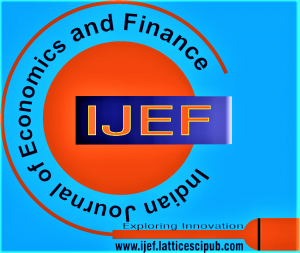![]()
An Analysis of Adoption Patterns and Challenges of Digital Marketing Strategies in Agribusiness: Special Reference to Coconut Farmers
V Murugesh1, Jincy D2
1Dr. V Murugesh, Assistant Professor, Department of Commerce, PSG College of Arts & Science, Coimbatore, (Tamil Nadu), India.
2Mrs. Jincy D, Scholar, Department of Commerce, PSG College of Arts & Science, & Assistant Professor, Department of Commerce, SKACAS Coimbatore (Tamil Nadu), India.
Manuscript received on 08 October 2025 | First Revised Manuscript received on 18 October 2025 | Second Revised Manuscript received on 01 November 2025 | Manuscript Accepted on 15 November 2025 | Manuscript published on 30 November 2025 | PP: 84-89 | Volume-5 Issue-2, November 2025 | Retrieval Number: 100.1/ijef.B263905021125 | DOI: 10.54105/ijef.B2639.05021125
Open Access | Editorial and Publishing Policies | Cite | Zenodo | OJS | Indexing and Abstracting
© The Authors. Published by Lattice Science Publication (LSP). This is an open-access article under the CC-BY-NC-ND license (http://creativecommons.org/licenses/by-nc-nd/4.0/)
Abstract: The digital space in agribusiness enables coconut farmers in Coimbatore district, Tamil Nadu, to deal with the systemic barriers that hinder their access to the markets and income generation. This situation has been analysed, leading to the conclusion that farmers can profit from a proper understanding of the facilitating factors, thereby widening the scope and increasing productivity if digital constructive use is inculcated. The research analysed why small farmers get trapped in traditional marketing modes, failing to adopt necessary changes, such as using digital tools despite their utility. A descriptive research design was followed, and primary data were collected from 65 coconut farmers using a structured questionnaire. The survey focused on demographic characteristics, the marketing mix, reasons for adopting digital media or challenges to adoption, satisfaction levels, and market performance. Chi-square tests, cross-tabulations, and principal component analysis were used to analyse the data and draw conclusions about the association between education and patterns of media adoption and market performance. The findings suggest that educational attainment is a leading determinant of digital marketing uptake and the issues associated with it. Digital literacy is cited most often as the predominant challenge by farmers with higher secondary education, but 54% of farmers with degrees report reaching out with fear of trust issues. The most common method is traditional marketing, used by 43.1 per cent of respondents. Those who use digital-only strategies are 32.3, and those who use a mixture of traditional and digital approaches are 24.6. Early adopters comprise 28% of the sample, and late adopters comprise 30%, with better-educated farmers adopting digital marketing more quickly. Most farmers are satisfied with digital marketing; 76% have indicated that cost effectiveness has led to their satisfaction, and 68% have said that their sales conversion rates have improved. The market results demonstrate that 72 per cent of the farmers achieved higher prices, 64 per cent experienced growth in sales volume through digital marketing, and 48 per cent noticed moderate profit improvements. The research finds that body-focused measures, including training, infrastructure development, and sensitisation initiatives, are required to hasten the uptake of digital marketing among coconut farmers. By mitigating significant adoption barriers, stakeholders can reduce farmers’ dependence on intermediaries, Increase their competitiveness and improve outcomes in their economic processes. This study identifies the potential for transforming digital marketing in agribusiness. It offers policies and guidelines applicable to policy-makers, farming institutions, and providers of digital services, with a view to fostering good use.
Keywords: Digital Marketing, Agribusiness, Coconut Farmers, Adoption Patterns, Market Outcomes, Coimbatore.
Scope of the Article: Economics
